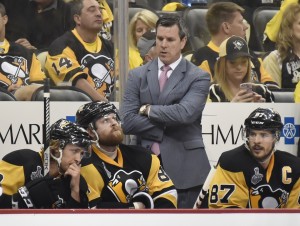Former University of Arkansas Razorbacks basketball coach Nolan Richardson coined the phrase “40 minutes of hell.” It described what the Razorback’s opponents could expect. Arkansas brought relentless energy every moment of the game, over every square foot of the floor.

A hockey game goes for 60 minutes, and if there is hockey team deserving of a similar moniker, upgraded to 60 minutes, it is the Pittsburgh Penguins. The Penguins make life difficult by playing relentless hockey. This style of play benefits Pittsburgh.
There are plenty of challenges to playing this style. Depth and talent come to mind, but also, the ability to recover from you own mistakes. The Pens ability to play as hard and fast as they do while making few mistakes is impressive.
Their ability to recover from their mistakes before San Jose (and I’d imagine just about every other NHL team) can make them pay is a big part of what makes them special. At almost any point in a game, they are able to turn other team’s small errors into a big play, often a game-changing play.
Game Changing

The pivotal moment during Pittsburgh’s Game 4 victory in San Jose against the Sharks is a perfect example. Early in the game, San Jose was getting the better of the play, but the game was scoreless. Then San Jose committed an error. Sharks defenseman Roman Polak went for a hit in the center ice area just a few feet from San Jose’s bench.
Polak was on the wrong side of the ice, a right-handed defenseman on the left side (as viewed from the San Jose goalie perspective). The man with the puck, the Pen’s Evgeni Malkin, withstood Polak’s contact and fed the puck to a speeding Phil Kessel. The Sharks compounded their problem by executing a line change just as the play was turning, creating plenty of open ice.
When Kessel took the puck at the center line, all five Sharks were defensively deeper than Kessel. Four quick strides later, as Kessel crossed the blue line into San Jose’s zone, all the Sharks were on their left defensive side (bench side) of the ice and only one, Sharks defenseman Brenden Dillon, remained between Kessel and the goal. Dillon took Kessel, forced him wide, and Kessel got a shot from a sharp angle inside the face-off circle.
When Kessel shot, all four Sharks in the defensive zone were inside face-off circle on the left side. Kessel had drawn all of their attention. In the neutral zone area, two other Sharks were also on the left side of the ice as they came off the bench, though they were irrelevant to the play (4+2=6. Yes, San Jose could have been called for too many men).
Sharks goalie Martin Jones made the save on Kessel, but the rebound ended up near face-off dot on the other side. No Sharks player was on that side of the ice, but Penguins defenseman Ian Cole was. Cole fired the puck home for a 1-0 Pens lead.
Against Pittsburgh, this sort of brief breakdown is often game changing. It is worth noting when Cole scored the goal, he and Kessel were the only Pens players in the offensive zone. Pittsburgh’s relentless play, coupled with their speed and skill, and mistakes made by the four Sharks defenders in following Kessel, won the key moment.
Down a goal against Pittsburgh is a pretty big hill to climb, given the Sharks had managed just four regulation goals in three games. In the second period, a questionable call against Melker Karlsson led to a Penguins power play. The Penguins seized the moment, with Malkin slipping behind the backside of the Sharks defense and camping out at the far post. When Kessel’s cross-ice pass got through San Jose’s defense, Malkin easily tipped the puck home and the Pens led 2-0. The pretty big hill had turned into a huge mountain.
The Comeback Falls Short

It does not take much for Pittsburgh to grab a game. Sharks coach Peter DeBoer shortened his bench and juggled his lines. San Jose’s aggressive play allowed them to get within a goal. But most of the excellent scoring chances were cleanly stopped by Penguins goalie Matt Murray. For all the line juggling at the top, it was third line which gave the Sharks the most hope. Melker Karlsson scored a goal to make it 2-1 with over 11 minutes remaining. Nick Spaling also got close, hitting the crossbar.
The Sharks controlled play, created scoring chances and took risks. Pittsburgh was able to fend off the Sharks efforts. Risk-taking against the Penguins is playing with fire. In the 58th minute of hell, the Pens turned San Jose’s aggressiveness against them, with a quick strike from Eric Fehr for the backbreaking goal.
Fehr’s goal made the Game 4 final score 3-1. Pittsburgh now has a 3-1 margin in the series over San Jose. The Penguins dominated play in the first two games of the series, before San Jose fought back in Game 3. Game 4 might have been the most even game of the series, though the play itself was rarely even.
There were times San Jose carried the play, and other times where Pittsburgh carried it. In the second period, Pittsburgh completely throttled the Sharks offense, holding them to four shots. Yet San Jose dominated play in the third period. The outlook for San Jose is bleak. It would be tough to win three straight games even if the Sharks were the team playing better hockey. They are not the team playing better hockey.
What makes Pittsburgh special is what makes playing them a hellish experience for others. There is simply no room for error. Down 3-1 in the best of seven series, the Sharks have run out of room for error.
For almost all the San Jose Sharks players and staff, participating in the Stanley Cup Final is a fresh experience. It was cynical author Dorothy Parker who famously used the phrase “what fresh hell is this?” The Sharks are one loss away from finding out.
Zeke’s Notes
The Ian Cole goal described in detail above is schematically almost identical to a major moment early in the season involving the same two teams. A shot from the left-side circle is saved by the goalie, the rebound ends up in the right-side circle area and is put in the net by a defenseman. In the game in November, San Jose’s Joel Ward takes the shot, Marc-Andre Fleury makes the stop and Brent Burns puts home the rebound. This goal is used by the Sharks in its advertising to promote the hockey team. The reason the play was important? The second assist went to Patrick Marleau giving him career point 1,000.
A popular theme about the series is the Sharks failing to get the first goal or play with the lead. I sense frustration creeping in from comments by both Sharks players and coaches. If San Jose is to find a way to come back in this series, they may have to overcome an in-game deficit. Should they fall behind Pittsburgh again in Game 5, it will be interesting to see if that frustration shows up in their play.
The penalty call against Karlsson came up in the postgame press conference. A reporter asked DeBoer if the Pens player had flopped. DeBoer, who rarely takes the bait on questions like this, indicated he probably saw it the same way.